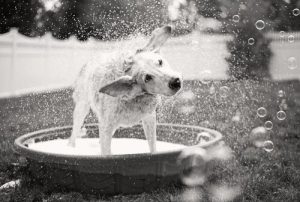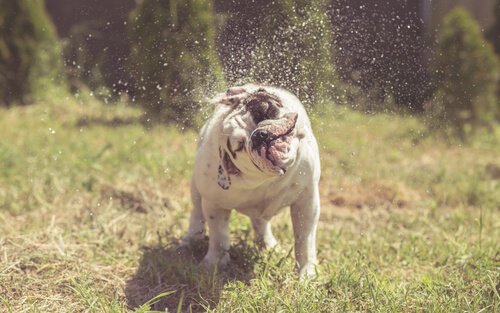Why Does Your Dog Shake Himself?

All dog owners have seen how dogs shake themselves from head to the tip of the tail. Although this behavior is normal, it can also be a symptom of some discomfort.
Since you don’t take any risks, it’s a good idea to know why your dog shakes himself and know when you should be worried. The following provides information on the main reasons why dogs shake themselves, which can be very useful when you go to the vet.
5 Reasons Why Your Dog Shakes Himself
As mentioned before, there are many reasons why dogs shake themselves. Therefore, it’s good to consider how much they dog and the context. You should also see if this behavior is accompanied by some other symptom.
Are They Shaking After Bathing?
This is the most common reason that dogs shake themselves. They’re just trying to dry themselves off after bathing or walking out on a rainy day. It’s estimated that shaking removes some 70% of the water from their fur and skin.
Dogs have an instinctive need to dry themselves for several reasons. Firstly, their coat is much heavier when it’s wet, which makes it harder to move and makes them feel uncomfortable. By shaking themselves, they relieve themselves immediately and feel much better.

On particularly hot days, dogs like to refresh themselves in the water, but this doesn’t mean that they like being wet for a long time. Heat and humidity cause a sort of greenhouse effect on dogs and it’s very uncomfortable for them.
A hot and humid climate also increases the reproduction of bacteria, fungi, and yeast, which can be bad for your pet’s health. Therefore, don’t forget to dry them properly where you can, especially on the ears.
Are They Shaking Themselves and Scratching A Lot?
If your dog is shaking himself, but also scratching or rubbing himself on the ground, this could mean that they have some external parasites. Mites, ticks, or fleas can settle into the dog’s skin and suck their blood for nutrients. External parasites don’t just itch though. They can also cause allergies, inflammation, and severe diseases.
To avoid the risk of infection, it’s really important to regularly apply parasite treatments to your dog. There are many different antiparasite treatment you can get at pet shops, such as collars, pipettes, sprays, soaps, etc.
Does Your Dog Spend A Lot Of Time Outside?
Dogs that spend many hours outside can come into contact with impurities or allergens (pollen, dust, or mold). Many dogs also like to play on the ground, rolling around on the grass or among the leaves.

Rolling on the ground can get your dog dirty and eventually he’ll start itching, Therefore, if your dog is used to playing outside, and they don’t mind getting dirty when they’re having fun, they could be shaking themselves just to get clean.
Does Your Dog Have Any Problems With Anxiety Or Stress?
Dogs that live in a negative environment or who have a sedentary routine can develop symptoms of stress and boredom. Because they’re not able to channel their energy, tension builds up and they look for a way to let off steam. In this way, stress can influence their behavior and habits.
Many dogs shake themselves to relieve stress by releasing tension. In these cases, shaking makes them feel better. So, it’s important to remember that your pet needs to do physical exercise every day to keep its body and mind healthy.
Does Your Dog Shake Their Head And Ears A Lot?
Generally, if they intensely shake their head a lot, it means that there’s a problem with their ears. This could be an infection or inflammation of the ear canal (otitis). Shaking themselves could also mean that they have something stuck in their ear.
If you see your dog shaking its head a lot, gently check their ears. If you can’t find anything, then take your dog straight to a vet for a proper diagnosis.
